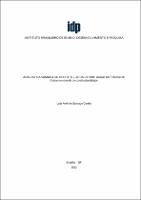Use este identificador para citar ou linkar para este item:
https://repositorio.idp.edu.br//handle/123456789/4112| Título: | Análise da Súmula 347 do STF à luz da CF/1988: atuação dos Tribunais de Contas no controle de constitucionalidade |
| Autor(es): | Corrêa, Luiz Antônio Santiago |
| Orientador(es): | Fernandes, Tarsila Ribeiro Marques |
| Palavras-chave: | Direito público;Tribunais de contas;Controle externo;Controle de constitucionalidade;Súmula 347 do STF |
| Data de submissão: | 2022 |
| Citação: | CORRÊA, Luiz Antônio Santiago. Análise da Súmula 347 do STF à luz da CF/1988: atuação dos Tribunais de Contas no controle de constitucionalidade. 2023. 112f. Dissertação (Mestrado em Direito) — Instituto Brasileiro de Ensino, Desenvolvimento e Pesquisa – IDP, Brasília, 2022. |
| Resumo: | O presente trabalho tem como como objetivo estudar a possibilidade de participação dos
Tribunais de Contas, órgãos independentes de estatura constitucional, no controle de
constitucionalidade. O problema de pesquisa gira em torno da Súmula 347 do STF, que foi
editada em 1963, durante a vigência da Constituição de 1946, a qual, formalmente, jamais foi
revogada. Questiona-se, assim, se a referida Súmula teria sido recepcionada pela Constituição
de 1988 e se os Tribunais de Contas teriam ainda alguma participação dentro de um sistema de
controle de constitucionalidade. O estudo se restringiu à possiblidade ou não de análise de
constitucionalidade pelos Tribunais de Contas no caso concreto e dos efeitos inter partes desta
decorrentes, uma vez que, quanto aos efeitos erga omnes e vinculantes, já restou consolidada a
sua impossibilidade pelo STF. A pesquisa se estruturou de forma eminentemente bibliográfica,
por meio da qual foram construídas as premissas teóricas sobre os aspectos técnico-jurídicos da
formação do controle externo, do controle de constitucionalidade e das competências dos
Tribunais de Contas; foram, ainda, definidas as premissas a partir das quais se deve entender o
relacionamento entre o papel do controle externo na interpretação constitucional e o controle
de constitucionalidade, bem com a análise de validade da Súmula 347 do STF à luz da
Constituição de 1988. |
| Abstract: | This study’s theme is the Participation of the Court of Auditors in Constitutionality Control: The need to review Precedent 347 in light of the Federal Constitution of 1988, and had as its objective the study of the possible participation of the Court of Auditors, independent entities of constitutional stature, in the control of constitutionality. The research problem concerns the aforementioned Precedent, edited in 1963, when the Constitution of 1946 was in force, which was never formally revoked and was received by the Constitution of 1988, and if the Court of Auditors in the present day would have some participation in a system of constitutionality control. The study limits itself to the possibility (or not) of an analysis of constitutionality by the court of Auditors in a specific case with interparty effects, since erga omnes and binding effects are impossible within this forum, as determined in a precedent by the Supreme Court. The research was eminently structured on literature review, through which the theoretical premises were constructed on the legal-technical aspects of the origins of external control, constitutionality control, and jurisdiction for the Court of Auditors; the premises through which the relationship between the role of external control in the interpretation of the constitution and constitutional control, alongside the analysis of the validity of Binding Precedent 347 from the Supreme Court in light of the Constitution of 1988 were also defined through this means. |
| URI: | https://repositorio.idp.edu.br//handle/123456789/4112 |
| Aparece nas coleções: | Mestrado Profissional em Direito Econômico e Desenvolvimento - Brasília |
Arquivos associados a este item:
| Arquivo | Descrição | Tamanho | Formato | |
|---|---|---|---|---|
| DISSERTACAO_ LUIZ ANTÔNIO SANTIAGO CORRÊA _MESTRADO_2022.pdf | 757.9 kB | Adobe PDF |  Visualizar/Abrir |
Os itens no repositório estão protegidos por copyright, com todos os direitos reservados, salvo quando é indicado o contrário.
